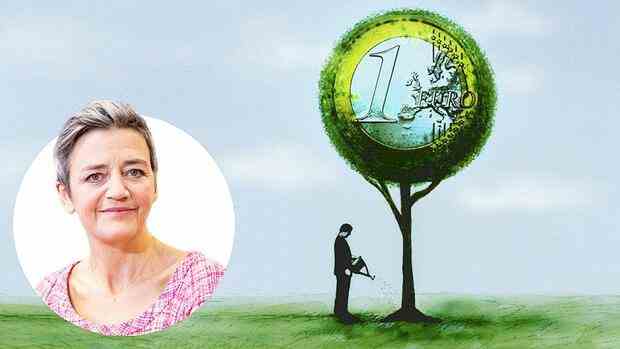Combating climate change and environmental degradation is our greatest challenge, which we must tackle in the interests of future generations. To be successful, we must revolutionize the way we live, produce and move.
This means unprecedented investments that require public and private forces to pull together. We need to create the right conditions to ensure that Europe remains an attractive place to invest in sectors that are strategic for the green transition. In addition, companies must seize opportunities by committing to future-proof technologies and rapidly expanding their green production.
With the Green Deal, Europe has already laid the foundations for becoming a climate-neutral continent by 2050. The Green Deal is the European growth strategy and will ensure the long-term competitiveness of the EU.
And in May we pressed ahead with the expansion of renewable energies and energy efficiency. Together with what we have already proposed about the Recovery and Resilience Facility and the EU budget, we have proposed at least €20 billion of new money for the REPowerEU plan.
Top jobs of the day
Find the best jobs now and
be notified by email.
The US commitment to combating climate change must not come at the expense of European industry
We face a double challenge for the competitiveness of our green industry. First, Russia’s war and weaponized use of energy has resulted in electricity prices significantly higher in Europe than in the United States. Second, the US Inflation Reduction Act provides generous incentives for US manufacturing build-up, sometimes in ways that discriminate against the European Union.
The climate is a global challenge that we must face together with our international partners. The commitment of the USA in the fight against climate change is therefore to be welcomed. However, not at the expense of European industry.
We continue to work with our US partners to avoid negative impacts of the US Inflation Reduction Act on Europe. Last week my colleague Valdis Dombrovskis and I had promising talks with our US counterparts at the Trade and Technology Council in Maryland on parts of the bill like electric vehicles, commercial vehicles and critical minerals. A dedicated high-level EU-US task force will find ways to address EU concerns.
>> Read here: EU Commission approves hydrogen funding worth billions
However, we in the EU also have to do our homework. Europe urgently needs to become a decarbonized continent with low energy prices. To facilitate this, we have put in place a Temporary Crisis Framework, allowing Member States to help businesses deal with the extraordinary surge in energy prices.
However, this can only provide short-term relief. In parallel, our state aid rules facilitate massive public investment in renewable energy production and the decarbonisation of industry’s production processes.
Our green and economic goals are intertwined. In 2020 alone, the Commission approved €81 billion in state aid across the EU for this purpose.
We have a challenge in terms of speed and effectiveness. We need to simplify the regulatory processes. This applies to approval procedures for the expansion of renewable energies.
However, this also applies with regard to the approval of state aid. The current context requires further simplification of the criteria for investments and closing of existing gaps to cover the whole value chain of strategic green sectors, including commodities.
This must be done quickly and after a fact-based assessment. To this end, we will consult Member States, which will serve as a basis for our next steps.
We must ensure a fair green transition across Europe
One thing is already clear: we can improve cooperation between the Commission and the Member States. This summer we approved two pan-European projects in 16 Member States, enabling €11 billion in state aid for innovation and infrastructure projects along the hydrogen value chain, which will attract €16 billion in private investment. This is excellent news.
We have also learned lessons from the process and exchanged ideas with national authorities on how to speed up the process on both sides.
I am convinced that together we can build on Europe’s strength – our diversity. This brings me to my last point. There is good reason to allow significant public support for the green transition, but not in a way that richer Member States outdo others.
This would lead to unequal competitive conditions in the EU internal market. That is why we need a European fund that complements existing instruments and helps to ensure a fair green transition across Europe.
Public support cannot do everything. In order to be competitive on the world stage, we must make further efforts to remove the internal market barriers that unfortunately still exist.
We must unleash the full potential of Europe’s most valuable asset, our single market.
The author:
Margrethe Vestager is Vice President of the EU Commission and responsible for competition and digitization.
More: The USA is funding its own economy with billions, to the annoyance of Europe – now Ursula von der Leyen is reacting
